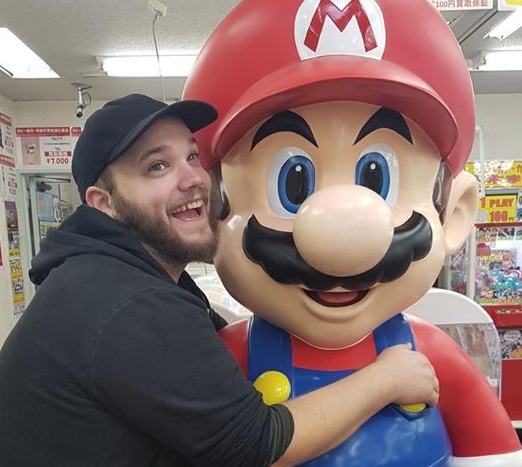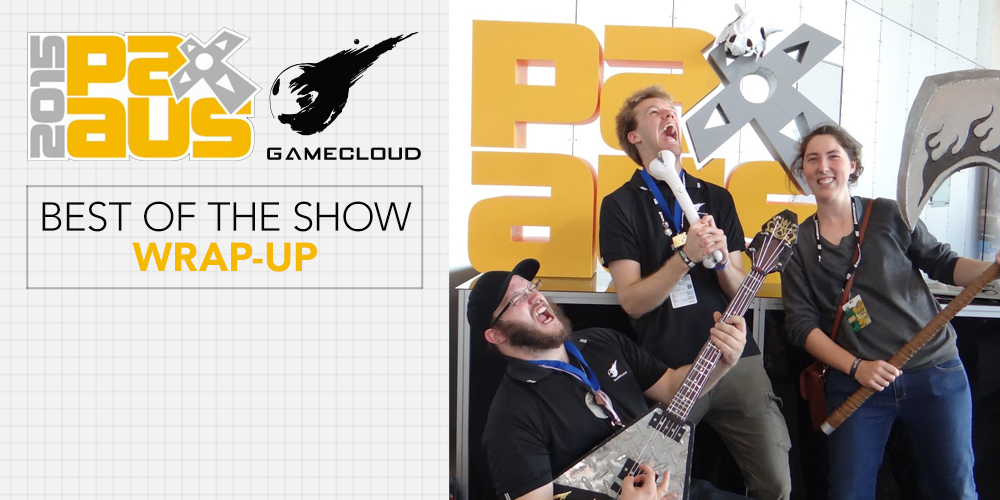
PAXAus 2015 is over for another year and our weary reporters have slunk off to their beds to sleep for a week. (We hear Nick sleeps upside down like a bat, and Ellis has some kind of re-breather chamber. No on wants to venture into Paddy’s place to find out about him, however.) Before they retired to their various hovels and holes in the ground, they shared with us their last thoughts about the convention in general. So before we flood you with interviews and impressions of games, let’s take a quick look back over the last three days and see what makes this event so great.
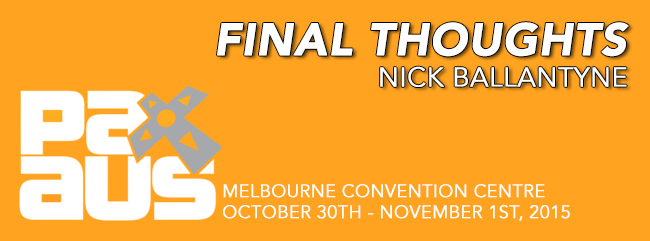
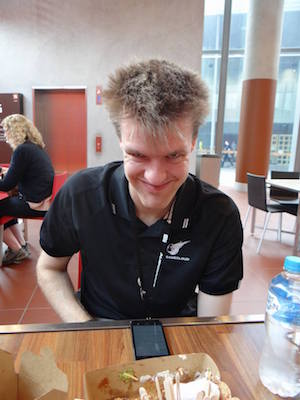
I’m broken, both literally and emotionally. PAX was as amazing as ever, but my God, I’m wrecked. There was so much on show, so much to see, and I loved every second of it, but my ability to form coherent sentences is well and truly pelican. Yet, despite my weariness, I can’t stop smiling, and I think a lot of others who attended are in much the same jolly place as me. It’s not because I’m delirious, but because PAX oozed positivity.
Without trying to sound so cliche that Uwe Boll would be jealous, PAX was just filled with wonderful human beings. From the enforcers to the attendees, everyone there was fueled by passion and enthusiasm. We all connected on the same nerdy levels and we all wanted to hear each other out because this was PAX. I was literally standing in line for an hour to play The Division, but it wasn’t an unpleasant experience because I made a temporary friend and talked about video games we loved.
To me, this is what makes PAX an event that I love to keep coming back to. There’s no misunderstanding of what we like, no justifying why we enjoy this stuff, we just accepted and supported this common passion. The stereotype people often see me as when I mention that I like games completely dissolves at PAX, and that’s just a wonderfully liberating and positive thing. So, yeah, PAX made me pretty happy. And now, I’m off to chop off my feet because they’re practically blobs of callous at this point.
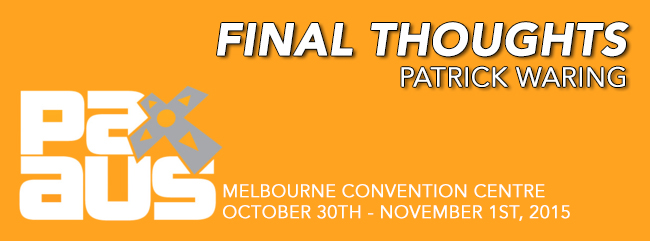
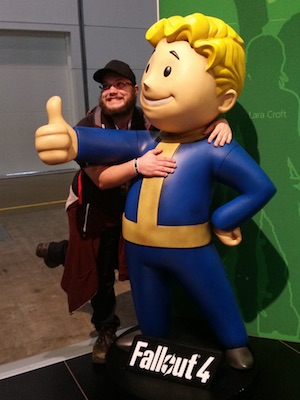
Another year, another PAXAus, and I’m still blown away by how much this show has grown, and continues to grow. The first PAXAus had but a handful of indie titles, selected specifically for their excellence, and last years had more than doubled that. The indie pavilion this year took up nearly a full quarter of the Expo Hall, with more still scattered around the place outside of the pavilion. I’ve watched games start out as mere alphas and betas that are now fully released and kicking ass in the indie scene. More than that, the diversity of indie games being developed and showcased every year has been simply astounding.
For an annual event that’s so “new,” relatively speaking, it’s certainly garnered quite a lot of high profile attention, as well. I remember back in 2013, Microsoft’s presence was almost exclusively a single XBox One that was encased in glass, and you could look at, but not touch it. This year there were games like Battleborn (SQUEEEEE), The Division, and even outfits like Alienware were on hand to show off their upcoming Steam Machines. I also had the privilege to speak to people like Deus Ex: Mankind Divided lead writer Mary DeMarle, and WA Greens Senator Scott Ludlam. (He is quite the champ, by the way, and with a keen interest in Australia’s game development industry.)
But more than all of that, it’s the extremely passionate players, gamers, developers and industry members that make this such an outstanding convention. In the first of these articles, I said that PAXAus was something more of a festival than a convention, and that’s exactly right. It’s more than just a bunch of vendors flogging shirts and mindless media to be consumed after an hour-long line wait. It’s a celebration about gaming culture in general, what we love about it, the ways that we enjoy it, and did I mention that Battleborn will be the name of my firstborn? Because it will be, if that demo was anything to go on. That technical test had better still be going when I get back to Perth.
PAXAus itself is a fantastic event, and the organisers should absolutely be proud of the work they’ve done to get it to this point. The event itself though is simply a framework for how to have a good time – it’s the community that makes it what it is. And after three more days of PAXAus, I myself am extremely proud to be a part of that community.
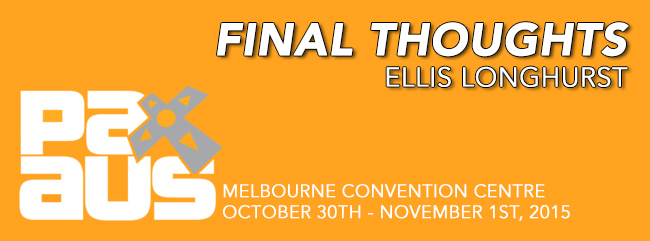
This was my first year attending PAX, and what an experience it was! My “Top Pick” for the last day of PAX was Syrinscape, but I’ll be writing a feature length review on another game in the coming week. That game is Agent A: A puzzle in disguise by Yak & Co. To briefly summarise, it’s brilliant.
Agent A aside, I found myself spending a considerable amount of time in the PAX rising section of the expo. The indie games on show were, for the most part, outstanding. Despite the mass return of pixel art, every game was well-made, presented, and fairly unique with their creators demonstrating a contagious passion for gaming. When considered in conjunction with the new PlayStation first initiative (multiple Australian independent developers have been pseudo-sponsored by Sony – providing them with assistance to launch their first game), it gives me a great deal of hope for the future of games development in Australia.
Another highlight of PAX were the Escape rooms: the secrets behind “live escape games” and The Anatomy Of Story: Making Meaning & Interactive Narrative panels. The first panel featured founders of various “escape experiences” around Australia – they discussed the elements that make said experiences successful, the elements they have in common with video games, and shared amusing anecdotes. The last 30 minutes of the panel simulated an escape room experience, with four teams of five randomly selected audience members competing against each other to solve a series of puzzles before the time ran out. The concept of an escape room is relatively new to Australia, but the formula is highly successful overseas (especially in Europe). This could easily have been just a marketing stunt (perhaps it was) but it was fun, and the active participation component made it pretty unique.
The other panel of experts examined how a narrative is formed in modern day games. Panelists cited games such as Journey, Lifeline, Portal and Gone Home, and engaged in some very intellectual discussions about different aspects of narrative and character development. This was, comparative to many of the other panels, quite a high brow and engaging panel experience and has demonstrated to me that the way we approach and think about games has changed significantly in recent years. And it’s ok to think about and discuss games in an intelligent way.
That’s it from me. Late nights, excessive amounts of talking, and crazy amounts of playing games has left my brain addled. I hope you enjoyed our coverage of PAXAus!



